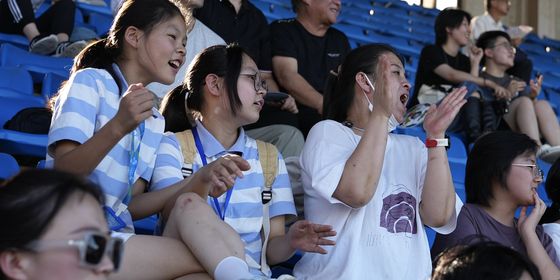Chinese football clubs are paying millions for foreign players and it’s raising eyebrows
President Xi Jinping’s goal to become a world soccer superpower by 2050 has certainly been an overwhelming success—but only if it’s a competition to spend the most. In 2014, China had invested nothing in foreign clubs; by 2016, 1.6 billion euros had been spent on players from teams in Italy, France, and Czech Republic, just to name a few.
Reports stating this figure had reached 2.15 billion euros. Tasked with uncovering investments, a merger and acquisition specialist group from London called Thinking-Linking found that China’s total spending was seven times larger than the United States. It comes a few days after FIFA boss Gianni Infantino met with Xi during a meeting at the Great Hall of the People. According to China Daily, the two “vowed to deepen cooperation” by making China a sporting power and contributing to its overall development goals. But critics say China is moving too fast, spending staggering amounts of money on players and not enough on native education and training.
Chinese investors usually look to work with high-profile clubs, such as Inter Milan in Italy, to secure the top international talent. Xi’s end goal is to host and win a World Cup by 2050, but with China’s men’s team only qualifying once in 2002 (and even that was due to the automatic qualification of the hosts, South Korea and Japan), the pressure is mounting from fans with high expectations. An Australian player contracted to a Nanjing admitted that the enormous sums of money spent on players could seem like “irrational” spending, but justified it by saying “if you want to get your name out to the public, especially in Europe, it’s what’s necessary”.
With the Chinese Super League’s transfer window opening, the Chinese Football Association (CFA) has contacted the 32 clubs in the top two divisions outlining a “player-transfer leverage fee” in an attempt to prevent extortionate spending on foreign players. Any club spending 45 million yuan or more on overseas players will pay a levy that will be invested in programs to encourage youth development. In an effort to promote player improvement in China, the number of foreign players per team in China is restricted to five, with only three foreign players allowed during a match. Other movements to boost popularity include soccer is becoming a mandatory subject at schools and plans to create 50,000 soccer schools within the next 10 years.
While spending is high, skill appears to be low. Whether this is due to a stronger academic focus among youngsters or a lack of space in the cities, the popularity and competitiveness of Chinese soccer does not meet international standards. It may also boil down to a preference for international players, hence neglecting home-grown players. China certainly has the ambition and potential for international soccer success, but investment must first start at home. Although CFA is starting to introduce tighter regulations to uphold the stability of debt-laden Chinese clubs, a lot more must be done before Xi can fulfill China’s dream of winning the World Cup by 2050.
Read about the world’s highest paid footballer skipping games to go to Disneyland.
Image via the China Daily.












